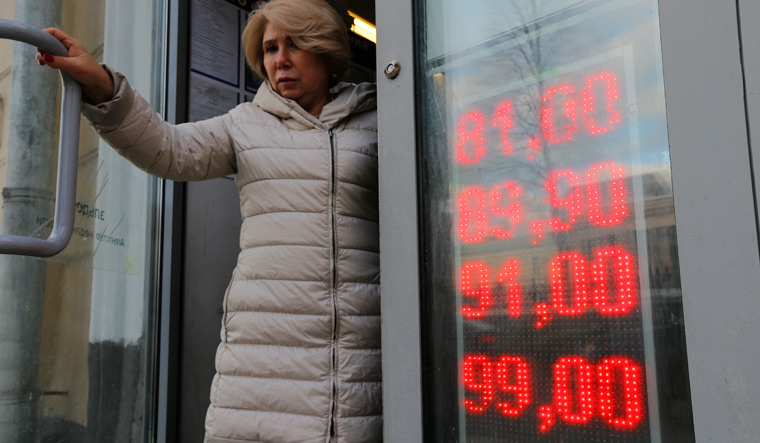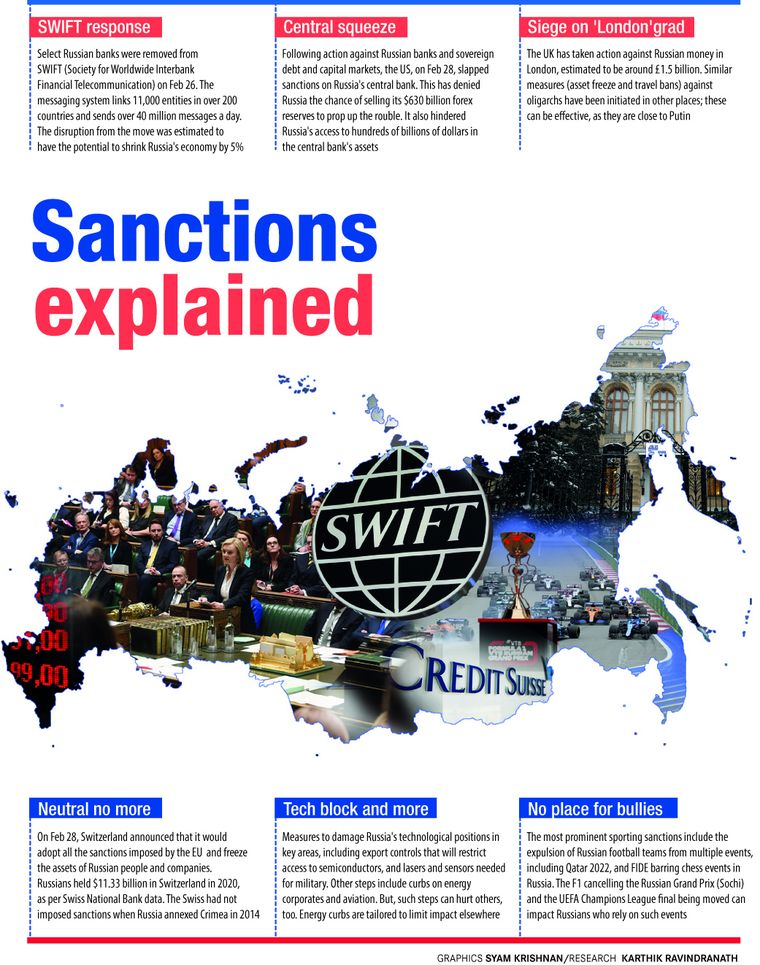Spring has arrived in Moscow. It is sunny outside and the sky is deep blue. It seems like the perfect time to enjoy the weather, but nobody does so. All passers-by are on their smartphones, following the events in Ukraine and the new sanctions that western countries are imposing on Russia. Ask passers-by what day it is, and they most likely will take time to answer. But, they can tell you that the dollar exchange rate at the Russian Central Bank is more than 100 roubles, up from only 75 roubles a week ago. But even at the new rate, it is impossible to buy dollars. Banks sell it at 150 roubles for a dollar
It all started about a fortnight ago with several addresses by Russian President Vladimir Putin to fellow citizens. The addresses came like an explosion, completely unexpected by the majority of the population, since almost everyone believed that the warnings by NATO countries about Russia’s impending attack on Ukraine was nothing more than western propaganda. However, on February 24, Putin told fellow citizens: “In December 2021, we once again made an attempt to agree with the United States and its allies on the principles of ensuring security in Europe and on the non-expansion of NATO. Everything is in vain. The US position does not change.”
Based on this, Putin also explained the decision to launch a special operation in Ukraine. “Those forces that carried out a coup in Ukraine in 2014, seized power and are holding it with the help of, in fact, decorative electoral procedures, have finally abandoned the peaceful settlement of the conflict,” said Putin. “For eight years, endlessly long eight years, we did everything possible to resolve the situation by peaceful, political means. It is all in vain.... Russia cannot feel safe, develop, exist with a constant threat emanating from the territory of modern Ukraine.... They simply did not leave us any other opportunity to protect Russia, protect our people, except for the one that we will be forced to use today.”
Now, after the fall of the rouble, amid rising prices and vague fears of escalation to a nuclear conflict, Muscovites leaf or scroll through the news, their faces gray and bleak. There is a continuous stream of information. But, it is becoming increasingly difficult to distinguish between the truth and fake news. Pro-government media write about the successful offensive of Russian troops in Ukraine, while opposition media cries about heavy losses.
The pressure from the state is growing. The authorities are tightening censorship every day, and the Russian prosecutor’s office reminds citizens that there is an article in the criminal code on high treason. “Fake news is all around,” the authorities warn. “Distribution of such information is prohibited. Only official reports of state departments of the Russian Federation, such as the ministry of defence, are trustworthy.”
The statements by pro-government bloggers and nationalists who support the operation on social networks are getting louder. Bloggers promoting “the strong hand of the state”, warn that “in an acute situation, an unambiguous choice must be made. And always be ready to bear responsibility for your choice. The current situation is a choice in wartime conditions, and the laws of war apply. By speaking now against your country, you make your choice.”
At the same time, there are more and more letters against the operation every day, signed by well-known figures in science, culture and academia, and journalists and doctors. There have been at least 10 open letters, including from students/graduates of the Moscow State Institute of International Relations of the Russian ministry of foreign affairs—the country’s main educational institution for diplomats. One open letter from medical workers says: “As in all times, we do not divide the belligerents into friends and foes. We swore an oath to help all people, regardless of nationality, religion or political views. But now our help is not enough. The fighting will take many lives, cripple so many destinies that we will not have time to help with all possible efforts. People will be shouting in pain and calling out to mothers in the same language.”
Almost every day, “anti-war” rallies take place on the streets of Moscow, St. Petersburg and other cities. These demonstrations end in the same way—the police arrive and take away the participants. Some are only fined, while others get up to 20 days in prison. The streets of St. Petersburg are covered with graffiti protesting the operation in Ukraine. There are fewer such inscriptions in Moscow, but they also exist. It is just that here they are more actively washed off and painted over.
Also read
- Who is Denis ‘WhiteRex’ Kapustin? Commander of the Russian Volunteer Corps killed in combat
- Ukraine's special services suspected in car bomb killing of Russian general in Moscow
- The ‘mouse’ that roared continues to be heard: Finland and the Russia-Ukraine war
- The digital kill-chain: Russia's mastery of a critical skill in modern warfare
- Russian cargo plane blacklisted by US lands in South Africa; could it strain Pretoria-Washington relations?
- Trump calls India, China 'primary funders' of Ukraine conflict, demands NATO countries to halt Russian energy purchases
Russian opposition leaders also speak out. For example, the head of the Yabloko party, Grigory Yavlinsky, said that he was expressing “a categorical protest against the outbreak of hostilities against Ukraine. This war is Russia’s war with the objective course of history, a war against time, a tragic fall from the reality of the modern world.” Opposition leader Alexei Navalny, who is now in prison, said that “Putin is trying to make everyone think that Russia attacked Ukraine, that is, all of us. But it is not [the case]. We must show that we do not support this bloody war.”
Tension and anxiety have led to a sharp division of Russian society into supporters of the operation and those who are against it. According to estimates by the state Russian Public Opinion Research Center (VTsIOM), published on February 28, 68 per cent of Russians support the decision to launch a special operation in Ukraine, while 22 per cent oppose it. But, it should be noted that VTsIOM does not enjoy much confidence among Russians, since it has been repeatedly suspected of juggling data. Independent sociologists estimate the number of hawks at about 30 per cent, the same number, in their opinion, oppose hostilities. The rest are vacillating.
In the first days after the start of the “special operation in Ukraine”, the vacillators mostly opposed such a move by Moscow. However, gradually they are getting used to it, thanks in part to massive propaganda by state and pro-state media. Therefore, every day there are more and more people who approve of military operations. That is why there is a feeling that opponents of the “special operation”, accused of betraying the motherland by pro-government patriots and nationalists, will become less active in the coming days. At the same time, ordinary citizens, as the socioeconomic problems caused by the sanctions grow, will be concerned not with the search for the truth, but with survival.
Additionally, the tightening of the state information policy will also contribute to the reduction of protests. Already, there is a partial blocking of social networks, such as Facebook and Instagram, as well as VPN services. The head of the human rights council of the Russian Federation proposed blocking Facebook altogether in Russia until the end of the special operation. And, as the head of the security committee of the state duma (lower house of the parliament) of the Russian Federation, Vasily Piskarev, said, on February 28, in the near future, parliamentarians may consider a bill that provides for up to 15 years in prison for “fake news about the actions of Russian troops”. The use of the word “war” in relation to what is currently happening in Ukraine is considered by Russian authorities to be “dissemination of false information,” which can be punished by a fine of more than $48,000.
Meanwhile, the problem of the worsening economic situation and the associated price rises looks more and more ominous every day. Store prices are rocketing. For example, the cost of a bottle of beer increased by 30 per cent in a few days. Consumer electronics prices are up by 50 per cent on average. Cars, including used ones, have become very expensive. And this is just the beginning of the sanctions.
The Russian government is trying to take measures to mitigate the problems. Thus, in response to the sanctions, the Russian Central Bank suspended trading to “cool the market”, more than doubled the discount rate to 20 per cent, and imposed a ban on the execution of orders from foreigners to sell their Russian securities. In addition, on February 28, a decree appeared on the mandatory sale of 80 per cent of the foreign exchange earnings of Russian exporters. In theory, this should support the Russian financial system. However, the overwhelming majority of Russians are not concerned about the liquidity of the banking sector, but about the expected rise in prices for food, medicines and essentials.
My aunt, who is 71, calls me five times a day to find out what will happen to her money. She has some savings—about 5,00,000 roubles (at the time of writing, it was equivalent to a little more than $5,000; how much it will be at the time of publication is anybody’s guess). She saved this money for emergencies, like medical expenses or surgery. Now, she asks me every day if she has already become destitute. I reply: Not yet.




